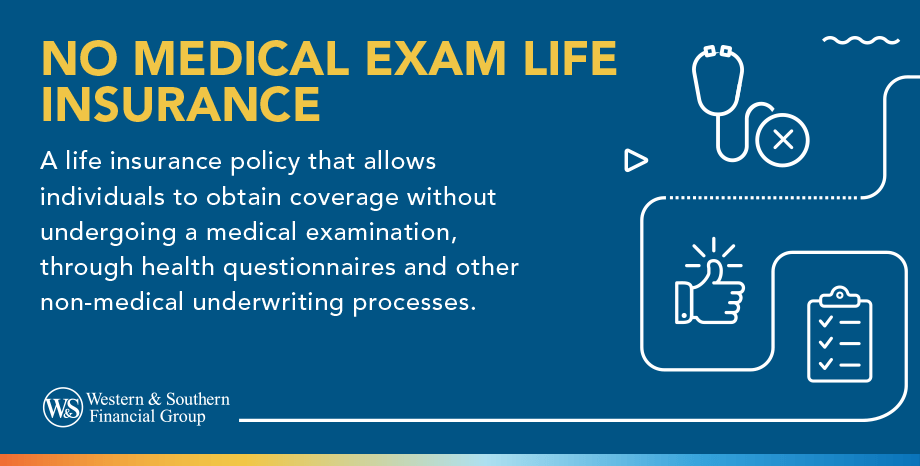

Key Takeaways
- Better health leads to lower premiums and increased chances of approval for life insurance.
- Life insurance companies require medical exams to verify health information, but some offer policies without them.
- Term life insurance policies can be obtained without a medical exam, but may have higher premiums.
- Whole life insurance policies without medical exams are expensive and limited in coverage and death benefit payouts.
- Consult a financial representative to make an informed decision about a no medical exam policy, as it can lead to higher costs, limited coverage options, and restrictions on death benefits.
To buy life insurance, you usually need to go through some sort of medical exam. That's not the case for all policies though. There are options for no medical exam life insurance, including whole life insurance without a medical exam.
While that simplifies the application process, there are potential drawbacks to a policy without an exam. Here's what to know and when these policies may make sense.
What Is a Life Insurance Medical Exam?
Whether you qualify for life insurance and at what price usually depends on your health. Someone in perfect health may qualify for a discount whereas someone with serious health issues may pay more and could even be denied from buying a policy altogether. To apply for coverage, you usually need to fill out a questionnaire answering questions about your age, weight and health.
The life insurance medical exam is a brief, routine follow-up to confirm this information. The insurance company could have you meet a medical professional to give you a physical, ask for more details about your health, collect blood and urine samples for lab work and/or undergo more testing. The insurer would then use this information to decide whether you qualify and at what price.
When Does Life Insurance Require a Medical Exam?
It depends on the insurance company and the policy type. Some insurers may require medical exams for all their policies. Others may specialize in no medical exam life insurance. Last, some companies may offer both options, meaning you can choose whether you apply with or without a medical exam.
It can also depend on how you answer the initial questions for your application. If you are younger and in good health, the insurer may decide to skip the medical exam. But if there's something they need to check up on, such as a family history of a certain disease or condition, they could require the exam.
Get life insurance coverage fast without the need for a medical exam. Get a Free Life Insurance Quote
Can You Get Term Life Insurance With No Medical Exam?
Term life insurance is temporary life insurance. These policies last a set number of years and the protection they provide ends after that period. For example, a 10-year term policy will cover you for 10 years. It is possible and somewhat common to find term life insurance policies that don't require a medical exam.
Term policies have age limits, such as not covering someone past their 85th birthday. This lets insurers offset some of the health risk because they know many of the policies will expire without paying out. For example, a 25-year-old may be less likely to die within the next 10 years, even if they have some health problems.
Can You Get Whole Life Insurance Without a Medical Exam?
Whole life insurance is a policy that doesn't expire. It lasts your whole life, so long as you keep paying the premiums. Finding a whole life insurance policy without a medical exam is also possible. These policies are sometimes referred to as simplified issue policies because they do not check or reject applicants for health issues. The application will not ask you any health questions or require you to take a medical exam.
What Are the Downsides of Skipping the Medical Exam?
Having blood drawn or taking an extra physical is not exactly fun, so it might be tempting to only apply for no medical exam life insurance. However, there are downsides to doing so. No medical exam policies generally charge more per month to make up for the extra risk of not screening for health issues — especially if you choose a simplified issue policy. No medical exam policies can also have more restrictions..
They may limit your coverage options to an amount smaller than what you might receive if you took an exam. With simplified issue policies, it's also common that they do not pay the death benefit if you pass away during the first two or three years after purchase.
Should You Consider No Medical Exam Life Insurance?
The answer depends on your reasons for buying coverage and your health. If you're in good health for your age, you could miss out on qualifying for a better premium rate simply due to forgoing an exam.
For a smaller term policy that you only use for a few years, the price difference could be small enough that the extra convenience is worth it. On the other hand, for larger policies with a longer term or for whole life, the price savings could justify going through the medical exam.
If you have serious health issues, a simplified issue policy with no medical exam might be the only option available. However, the underwriting may be more flexible than you expect, so it may be worth applying for a policy with a medical exam first before looking into other, more expensive options.
For more help reviewing your options, both for policies with and without a medical exam, consider meeting with a financial representative.
Access life insurance quickly with no medical requirements. Get a Free Life Insurance Quote


































